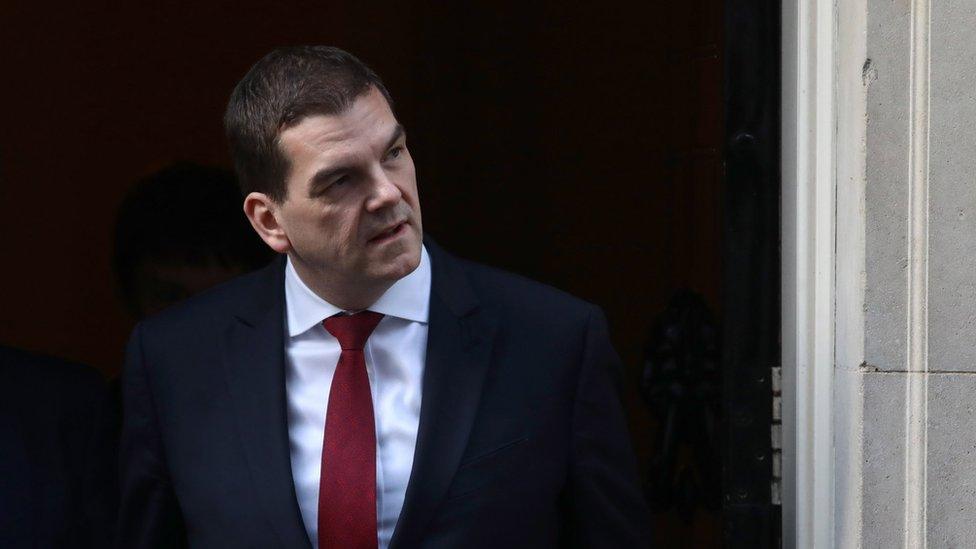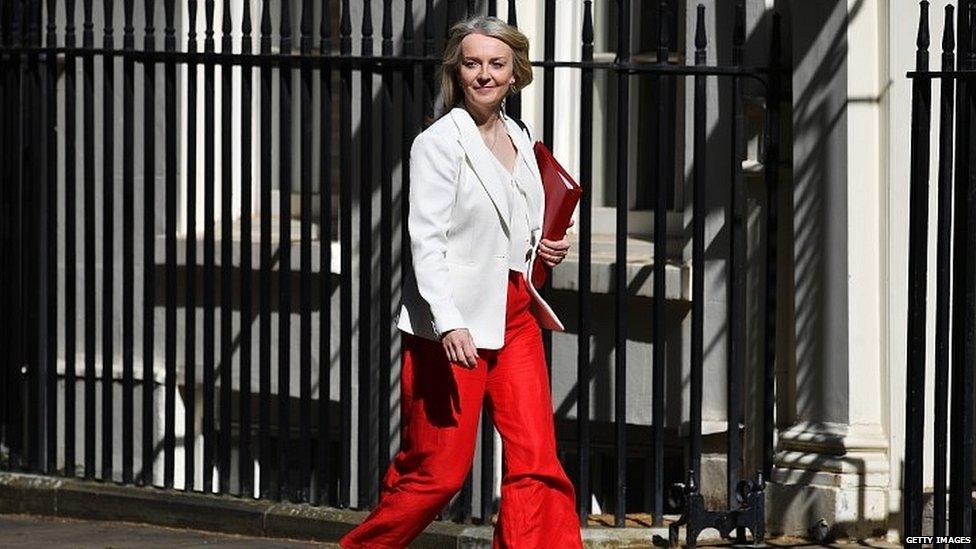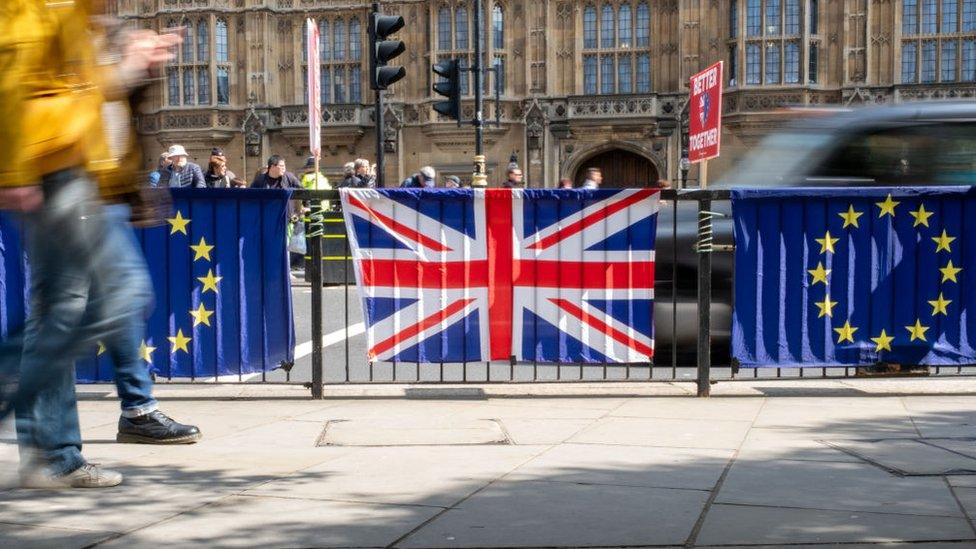Brexit: PM's negotiator to explore changes to future EU relations
- Published
- comments

Chief negotiator Olly Robbins will explore how quickly changes could be made to the political declaration
Theresa May's Brexit negotiator has gone to Brussels to explore the scope for changes to the agreement on the UK's future relations with the EU.
Olly Robbins is looking to see whether a key demand being made by Labour in cross-party talks can be satisfied.
But as cabinet discussed the state of the talks, Theresa May faced calls from senior Conservative MPs not to agree a compromise with Jeremy Corbyn.
Ex-defence secretary Sir Michael Fallon said the process was a "blind alley".
The Labour leader is also facing demands from his MPs to abandon the talks, which have been going on for more than a month with little apparent progress.
Attempts to find a cross-party compromise began after Theresa May's Brexit deal was rejected three times by MPs.
The inability to agree on a way forward led the UK to miss its 29 March deadline for leaving the EU - the current date for departure is 31 October.
Labour negotiators want any deal they strike with minister to be reflected in changes to the political declaration made with Brussels.
This 27-page document was published alongside Mrs May's withdrawal agreement and sets out the parameters for the future relationship between the UK and the EU, but is not legally binding.
In Brussels, Mr Robbins will explore how quickly changes could be made to the declaration if the government and Labour can come to an agreement.
European Commission spokesman Margaritis Schinas said officials were currently on a "Brexit break", but would come out of it "if there is something happening in London".
"We will listen to Olly Robbins tomorrow," she added.
Meanwhile, in Westminster, the cabinet has been taking stock of progress so far in the talks, while Labour's shadow cabinet will meet later to discuss the state of play.

Cabinet are discussing the state of the Brexit talks
Sir Graham Brady, chairman of the Tory backbench 1922 Committee, and 13 former cabinet ministers have written to Mrs May to warn her not to agree a compromise with Labour that includes a customs union with the EU.
Inside a customs union there would be no internal tariffs (taxes) on goods transported between the UK and other EU nations - something that is seen as advantageous for business.
But it would mean the UK cannot negotiate its own trade deals on goods with other countries around the world, and for some, that fails to satisfy the desire for a clean break with Brussels after Brexit.
Among the former cabinet ministers are Brexiteers Boris Johnson, Dominic Raab and sacked defence secretary Gavin Williamson, as well as Maria Miller and Sir Michael Fallon, who supported Remain in the 2016 referendum.
According to the Times, external, the letter said such a compromise would lose the support of Conservatives who previously backed the prime minister's deal, and would be unlikely to gain enough Labour votes to pass.
It said: "More fundamentally, you would have lost the loyal middle of the Conservative Party, split our party and with likely nothing positive to show for it. No leader can [bind] his or her successor, so the deal would likely be at best temporary, at worst illusory."
'Stepping stone'
Sir Michael said the government's focus should be on addressing Conservative and Democratic Unionist Party concerns over the Northern Irish border and finding alternative arrangements to the backstop, not doing a deal with Labour.
He told BBC Radio 4's Today: "The talks are clearly not going anywhere.
"If they are going to include permanent membership of a customs union then frankly we would be better off staying in the EU then we would have a voice in the trade arrangements that are being negotiated.
"We can't say we are leaving the EU then half stay in it."
A Downing Street source told BBC political editor Laura Kuenssberg that a compromise was being sought with Labour on customs "as an interim position or a stepping stone".
"We will not sign up to a permanent customs union," the source said.
"Both sides agree that no Parliament can bind a future government and most EU trade deals have a six to 12-month exit clause."
Allow X content?
This article contains content provided by X. We ask for your permission before anything is loaded, as they may be using cookies and other technologies. You may want to read X’s cookie policy, external and privacy policy, external before accepting. To view this content choose ‘accept and continue’.

Nick Boles, who quit as a Tory MP over Brexit, suggested, external Jeremy Corbyn would not "dig the PM out of a hole" so close to the European elections on 23 May - but "won't kill off the possibility of a deal either".
Allow X content?
This article contains content provided by X. We ask for your permission before anything is loaded, as they may be using cookies and other technologies. You may want to read X’s cookie policy, external and privacy policy, external before accepting. To view this content choose ‘accept and continue’.

At a meeting of Labour MPs on Monday night, Mr Corbyn faced repeated demands to abandon the talks with the prime minister. MPs fear that they are costing Labour support ahead of the elections.
But speaking after Monday's discussions with the government, shadow chancellor John McDonnell said they had been "constructive as always".
Ex-Tory MP Anna Soubry accused the opposition of being "all over the place", telling BBC Breakfast she feared Labour would "bail out this Conservative government to deliver Brexit".

- Published13 May 2019
- Published13 May 2019
